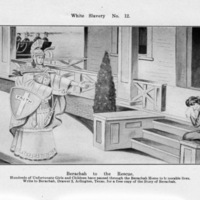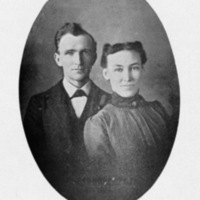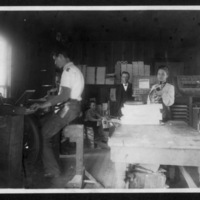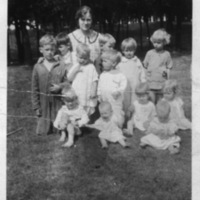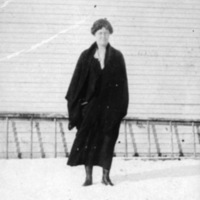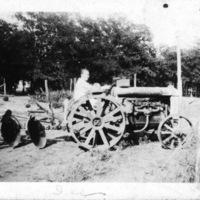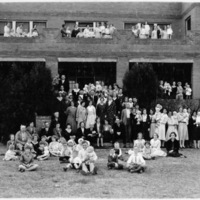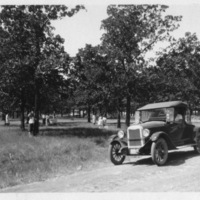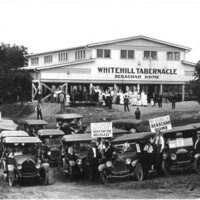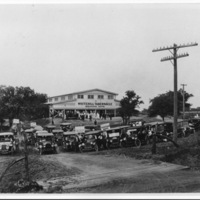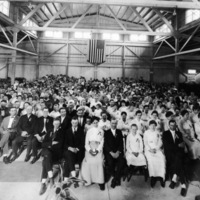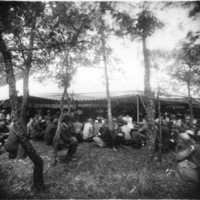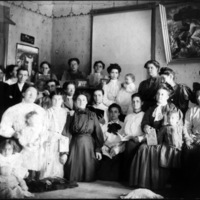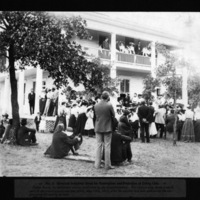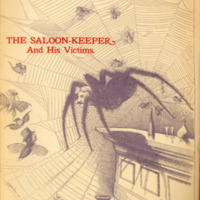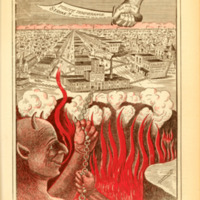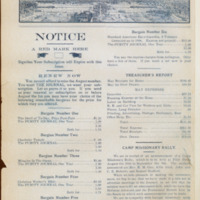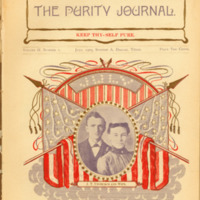Berachah Home (Arlington, Tex.) Collection
Identifier
AR280
Title
Berachah Home (Arlington, Tex.) Collection
Alternative Title
Berachah Industrial Home for the Redemption of Erring Girls (Arlington, Tex.)
Berachah Industrial Home (Arlington, Tex.)
Berachah Rescue Work
Description
The Berachah Home was established in Arlington, Texas, on May 14, 1903, by the Rev. J. T. Upchurch and his wife, Maggie Mae, as the Berachah Industrial Home for the Redemption of Erring Girls. It was operated under various names as an establishment for homeless, usually pregnant girls, in part by the Berachah Society in Dallas as part of the Nazarene Church. The Home closed in 1935, but was reopened later that year by the Upchurch’s daughter, Allie Mae, and her husband, Frank Wiese, as the Berachah Child Institute. The Institute ceased operation in 1942. The University of Texas at Arlington purchased the property in 1963. The collection includes correspondence, legal documents, financial reports, registers, newspaper clippings, and photographs, 1901-1981; The Purity Journal, 1904-1906; The Purity Crusader, 1915-1930 (microfilm); miscellaneous printed material, and typescripts, 1979-1985.
Historical Sketch
The Berachah Home was established on Rescue Hill on South Cooper Street in Arlington, Texas, May 14, 1903. 1
Reverend James Tony (J.T.) Upchurch, the Home's founder, initially established the Berachah Rescue Society in Waco, Texas, in 1894 for the purpose of redeeming and aiding prostitutes and other "fallen" women. After some success, he and his wife Maggie Mae moved to the Oak Cliff area of Dallas, Texas, in 1903 to continue the "mission" in Oak Cliff's slum areas. One newspaper account contends he was "driven away [from Waco] by angry fellow Methodist church members who opposed his missionary work with prostitutes." 2
A trip to Arlington resulted in the purchase of the original twenty-seven acres of land for the establishment of the Berachah Home for homeless, usually pregnant, girls. These girls came from Texas and the surrounding states to have their babies and learn to care for themselves. Adoption was not allowed as Reverend Upchurch believed mothers and children should not be separated.
During the next thirty-two years, the Home expanded to include forty more acres, purchased in 1928, a hospital/clinic, nursery, dormitory, dormitory and dining room named Hammil Hall, printing shop, handkerchief factory, chapel, office building, schoolhouse, auditorium, barn, and a cemetery.
The girls were kept busy working in the printing shop, gardening, operating the handkerchief factory, teaching at the school, and working at the hospital/clinic.
The Home was funded by Dallas-Fort Worth area businessmen. It was primarily for the contributors that Reverend Upchurch published The Purity Journal, to keep them informed about the Home's affairs.
The Home closed in 1935 for reasons not clearly known, but perhaps due to competition from the Edna Gladney Home in Fort Worth, or because of Reverend Upchurch's poor health. It was reopened later that year as an orphanage, the Berachah Child Institute, by Reverend Upchurch's daughter Allie Mae and her husband, Reverend Frank Wiese. In 1942 the property was purchased by the Christian Missionary Alliance. Correspondence in Box 1, Folder 3 indicates Reverend Wiese attempted to get the Dallas Church of the Nazarene to take over the Berachah Child Institute in 1941, but the offer was rejected. The University of Texas at Arlington purchased the property in 1963 and is the current owner.
On March 7, 1981, an historical marker was erected at the cemetery site, the only surviving structure on Rescue Hill.
Notes:
1 The Berachah Home was originally named the Berachah Industrial Home because of the handkerchief factory operated on the site.
2 Arlington Citizen-Journal, 21 January 1981, Section C, p. 1. Box 1, Folder 2.
Sources:
Arlington Citizen-Journal. 21 January 1981. Box 1, Folder 2.
Dallas Times Herald. 8 March 1981. Box 1, Folder 2.
Fort Worth Star-Telegram. 22 February 1981. Box 1, Folder 2.
Manion, Lynn and Jan Dolph. "A Short History of the Berachah Home and Berachah Cemetery, Arlington, Texas." Paper presented to The University of Texas at Arlington, City and Regional Planning 5391, 1979. Box 1, Folder 1.
The Berachah Home was established on Rescue Hill on South Cooper Street in Arlington, Texas, May 14, 1903. 1
Reverend James Tony (J.T.) Upchurch, the Home's founder, initially established the Berachah Rescue Society in Waco, Texas, in 1894 for the purpose of redeeming and aiding prostitutes and other "fallen" women. After some success, he and his wife Maggie Mae moved to the Oak Cliff area of Dallas, Texas, in 1903 to continue the "mission" in Oak Cliff's slum areas. One newspaper account contends he was "driven away [from Waco] by angry fellow Methodist church members who opposed his missionary work with prostitutes." 2
A trip to Arlington resulted in the purchase of the original twenty-seven acres of land for the establishment of the Berachah Home for homeless, usually pregnant, girls. These girls came from Texas and the surrounding states to have their babies and learn to care for themselves. Adoption was not allowed as Reverend Upchurch believed mothers and children should not be separated.
During the next thirty-two years, the Home expanded to include forty more acres, purchased in 1928, a hospital/clinic, nursery, dormitory, dormitory and dining room named Hammil Hall, printing shop, handkerchief factory, chapel, office building, schoolhouse, auditorium, barn, and a cemetery.
The girls were kept busy working in the printing shop, gardening, operating the handkerchief factory, teaching at the school, and working at the hospital/clinic.
The Home was funded by Dallas-Fort Worth area businessmen. It was primarily for the contributors that Reverend Upchurch published The Purity Journal, to keep them informed about the Home's affairs.
The Home closed in 1935 for reasons not clearly known, but perhaps due to competition from the Edna Gladney Home in Fort Worth, or because of Reverend Upchurch's poor health. It was reopened later that year as an orphanage, the Berachah Child Institute, by Reverend Upchurch's daughter Allie Mae and her husband, Reverend Frank Wiese. In 1942 the property was purchased by the Christian Missionary Alliance. Correspondence in Box 1, Folder 3 indicates Reverend Wiese attempted to get the Dallas Church of the Nazarene to take over the Berachah Child Institute in 1941, but the offer was rejected. The University of Texas at Arlington purchased the property in 1963 and is the current owner.
On March 7, 1981, an historical marker was erected at the cemetery site, the only surviving structure on Rescue Hill.
Notes:
1 The Berachah Home was originally named the Berachah Industrial Home because of the handkerchief factory operated on the site.
2 Arlington Citizen-Journal, 21 January 1981, Section C, p. 1. Box 1, Folder 2.
Sources:
Arlington Citizen-Journal. 21 January 1981. Box 1, Folder 2.
Dallas Times Herald. 8 March 1981. Box 1, Folder 2.
Fort Worth Star-Telegram. 22 February 1981. Box 1, Folder 2.
Manion, Lynn and Jan Dolph. "A Short History of the Berachah Home and Berachah Cemetery, Arlington, Texas." Paper presented to The University of Texas at Arlington, City and Regional Planning 5391, 1979. Box 1, Folder 1.
Subject
Arlington History
Berachah Home (Arlington, Tex.)
University of Texas at Arlington History
Upchurch, J. T. (James Tony), 1870-1950
Upchurch, Maggie Mae, 1873-1963
Berachah Cemetery (Arlington, Tex.)
Berachah Society (Dallas, Tex.)
Church work with women--Texas--Arlington
Church work with women--Nazarene Church
Women--Charities--Texas--Arlington
Children--Institutional care--Texas--Arlington
Social work with women--Texas--Arlington
Female juvenile delinquents--Texas--Arlington
Berachah Industrial Home (Arlington, Tex.)
Berachah Industrial Home for the Redemption of Erring Girls (Arlington, Tex.)
Creator
Berachah Home (Arlington, Tex.)
Coverage
1901-1985
Arlington, Tex.
Type
Image
Language
English
Publisher
Special Collections, The University of Texas at Arlington Libraries
http://library.uta.edu/special-collections
Rights Holder
Any use of content downloaded or printed from this site is limited to non-commercial personal or educational use, including fair use as directed by U.S. copyright laws. For more information or for reproduction requests, please contact Special Collections at The University of Texas at Arlington Libraries.
Rights
Any use of content downloaded or printed from this site is limited to non-commercial personal or educational use, including fair use as directed by U.S. copyright laws. For more information or for reproduction requests, please contact Special Collections at The University of Texas at Arlington Libraries.
License
Attribution-NonCommercial 4.0 International (CC BY-NC 4.0) http://creativecommons.org/licenses/by-nc/4.0/
Source
Berachah Home Collection, AR280, Special Collections, the University of Texas at Arlington Libraries, Arlington, Texas
Access Rights
Any use of content downloaded or printed from this site is limited to non-commercial personal or educational use, including fair use as directed by U.S. copyright laws. For more information or for reproduction requests, please contact Special Collections at The University of Texas at Arlington Libraries.
Relation
The Purity Journal (1904- )
The Purity Crusader, 1915-1930

